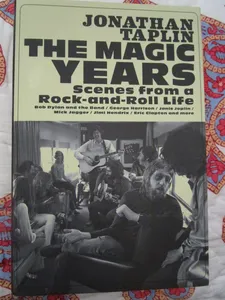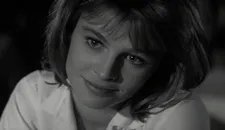 |
| Jonathan Taplin with Anne-Katrin Titze on Wim Wenders and Edward Hopper: “Obviously Wim is a student of Hopper in every possible way.” |
During my conversation with film producer (and so much more) Jonathan Taplin on his terrific memoir, The Magic Years: Scenes From A Rock-And-Roll Life (Heyday), we discussed his working with Martin Scorsese (Mean Streets, The Last Waltz concert film on the Band) and Wim Wenders (Until The End Of The World); Shelley Duvall’s Faerie Tale Theatre; Aretha Franklin in Amazing Grace; Eric Clapton and faith; Quentin Tarantino, Charles Manson and Once Upon a Time … in Hollywood; Robert Frank and The Rolling Stones; Leni Riefenstahl, Jodie Foster, and John Hinckley, and Scott Hicks, Shine, and Harvey Weinstein.
Julie Christie in John Schlesinger’s Billy Liar, Billy Wilder’s Double Indemnity, Edward Hopper and Wim Wenders, Katharine Hepburn and his mother, the joyous rebellion of Elvis Presley, Little Richard, and Jerry Lee Lewis turning into Bob Dylan and The Times They Are A Changin’, Film Noir, Humphrey Bogart, Wallace Stevens, and countering the pessimism of Ben Lerner - all came up in the first instalment of my conversation with Jonathan Taplin.
 |
| Audrey Hepburn in Weejuns with Fred Astaire in Stanley Donen’s Funny Face |
He road managed Bob Dylan and the Band’s tours in the Sixties, met Martin Scorsese and became a film producer in the Seventies, worked as an executive for Merrill Lynch in the Eighties, helped to save Disney when he created the Internet’s first video-on-demand service in the Nineties, and was a University of Southern California professor at the Annenberg School for Communication and Journalism from 2003 to 2016.
From Los Angeles, Jonathan joined me on Zoom to talk about his illustrious life in-depth.
Anne-Katrin Titze: How are you? Where are you?
Jonathan Taplin: I’m in Los Angeles, in Pacific Palisades.
AKT: I’m in New York. So it’s good morning to you and good afternoon for me. Let’s jump right into your beautiful book. I would like to start with the ending where you quote Ben Lerner about the incapability of having a profound experience of art. It really got to me. You call it profoundly sad. What came to my mind were the lines from TS Eliot “The death of hope and despair/ This is the death of air.” I agree with you completely about the sadness. Your whole book seems to be countering that idea.
JT: Yeah. Look, I grew up at a time when art was a constant source of inspiration. First music and then movies constantly moved you forward towards hope and progress. I think the generation that Ben Lerner represents grew up in a profoundly cynical time. In some ways I trace it to the aftermath of 9/11 in the sense of a pervasive sense of fear and doubt and then cynicism when it was revealed that we went to war for no reason and that began to pervade the culture. If you think about the dominant TV dramas that came out after 9/11 - there was The Sopranos, Mad Men, Breaking Bad, Succession, Game Of Thrones.
 |
| Jonathan Taplin’s The Magic Years: Scenes From A Rock-And-Roll Life Photo: Anne-Katrin Titze |
And all of them have a similar antihero nexus in the sense that the protagonist is a terrible person who kills people, or deals methamphetamine, or is a soulless ad man who has no morals. And they battle a corrupt world where everyone else is on the take. So if you constantly throw that out to a generation that’s young, I think eventually that becomes a self-fulfilling prophecy. You begin to believe that that’s the way the world always has been.
AKT: The cynicism comes out of the fear as the closest thing that they can grasp.
JT: Right. You know, I think you’re a student of movies, and obviously there was another period, which was the very early 1950s, which we call Film Noir, with a similar situation. We had just dropped a bomb on Hiroshima, the possibility that the Russians would drop a bomb on us, that the world would end. I’m a lot older than you, but when I was in grade school in 1952/53/54, there were duck-and-cover drills.
Literally a siren would go off and you would have to dive under your desk as if that would protect you from an atomic bomb being dropped on Cleveland. I mean it was absurd as fact, but it was the pervasive sense of fear. Of course that reflected in the movie culture. A movie like Double Indemnity, where you say, Oh, Honey, we’ll kill your husband and we get all the insurance money, what could go wrong? All of the Bogart type characters.
AKT: I’m glad you mention Billy Wilder, because Billy Wilder’s cynicism people often love to overlook. And I always felt that Billy Wilder is extremely cynical.
JT: Totally! Totally cynical. I think we go through periods like this and sometimes it’s the culture reacting to external events which are more political events like Hiroshima or 9/11 and then we have to grow out of that. We have to come back to a place of hope. The Fifties in America were kind of a grim period and eventually they stopped making Films Noir and they started making slightly more hopeful movies.
 |
| Jonathan Taplin produced Wim Wenders’ Until the End of the World Photo: Anne-Katrin Titze |
And also in the musical culture you have this joyous rebellion that starts with Elvis and Little Richard and Jerry Lee Lewis and eventually into Bob Dylan and The Times They Are A Changin’. It could be that it’s temporal, we have to go through these periods and we grow out of them. Maybe Ben Lerner will at some point find some art that inspires him. Although he can’t admit it.
AKT: Let’s sincerely hope so. You mentioned that you may be a little older than I, but we share something in common. We both wore Bass Weejuns [and so did Audrey Hepburn in Stanley Donen’s Funny Face] as teenagers.
JT: Ha! Nobody knows what those are!
AKT: I loved them! I loved them.
JT: I did too!
AKT: I think they just went bankrupt. We should resurrect them. I also want to go back in time to your maternal grandfather and his neighbours: Dr. Thomas and Kit (co-founder of Planned Parenthood) Hepburn. Did you ever meet their daughter Katharine in Hollywood?
JT: I never got to meet Katharine, no. My mother used to tell me wonderful stories of Katharine as a young girl, because Katharine was two years older than my mother and was the ideal. She was doing everything right and she was so independent and my mother kept saying “Well, if Katie Hepburn can do it, why can’t I do that?” She was always using her as a cudgel against her own mother.
I think about Hartford, Connecticut in that day - here you are in the depth of the depression, but the thing that amuses me is my mother’s description of Wallace Stevens, the poet, who was an insurance executive during the daytime, you know. One of our greatest poets, but he worked as a Vice President of an insurance company.
 |
| Katharine Hepburn: Dressed for Stage and Screen at the New York Public Library for the Performing Arts at Lincoln Center Photo: Anne-Katrin Titze |
AKT: Yes!
JT: Walking past their house, and stopping, and taking two steps back and starting again, working out the rhythm of a poem in his head while he was walking to work.
AKT: Maybe that also influenced you, that you thought you could easily jump careers. If Wallace Stevens can do it, you can do it?
JT: My mother was incredibly encouraging of art. And her father, who was also an insurance executive, would literally go to Maine for two months in the summer and paint, paint watercolours. I have two of them in my house. He was a really good watercolour painter.
AKT: Apropos, what happened to the eight Edward Hopper paintings your grandfather had?
JT: My grandfather distributed them to his six children. Eventually they got handed down. But as they got handed down, the IRS evaluation of what they were worth just soared. So my older brother was given one, the IRS said you owe like $500,000 in taxes on this gift, so he had to sell it.
AKT: Did you ever talk about the Hoppers with Wim [Wenders]?
JT: I told Wim that there had been two of them in my house in the Fifties. Obviously Wim is a student of Hopper in every possible way. One of the pictures of Wim’s that he gave me was that famous one of the motel. It’s so beautiful, but it’s so Hopper, too.
 |
| Jonathan Taplin on Julie Christie in Billy Liar: “She changed my childhood.” |
AKT: Obviously, he is very very Hopper. It’s beautiful how things come around. Do you still have a crush on Julie Christie?
JT: I do! She changed my childhood. She was a vision, not just Darling, which everyone cites. But there was a movie before that, Billy Liar, she was just this vision of a spirited English girl. She was fabulous.
AKT: Thank you so much.
JT: Oh, it was so good to meet you virtually and have this talk. I really appreciate it.
AKT: Thank you so much, bye!
JT: Bye, see you!
Coming up - Jonathan Taplin on working with Wim Wenders and Martin Scorsese; Quentin Tarantino, Charles Manson and Once Upon a Time … in Hollywood; Robert Frank and The Rolling Stones; Leni Riefenstahl, Jodi Foster, and John Hinckley, and Scott Hicks, Shine, and Harvey Weinstein.





















